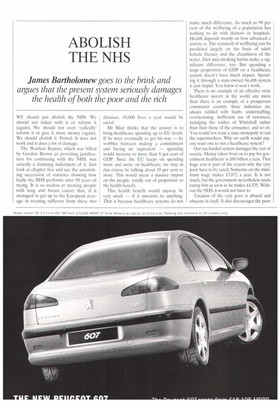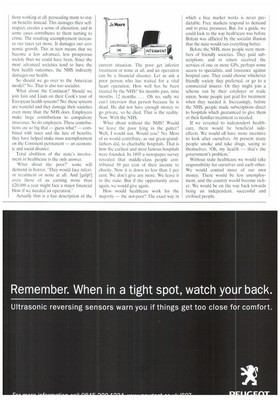ABOLISH THE NHS
James Bartholomew goes to the brink and
argues that the present system seriously damages the health of both the poor and the rich
WE should just abolish the NHS. We should not tinker with it or reform it (again). We should not even 'radically' reform it or give it more money (again). We should abolish it. Period. It does not work and it does a lot of damage.
The Wanless Report, which was billed by Gordon Brown as providing justification for continuing with the NHS, was actually a damning indictment of it. Just look at chapter five and see the astonishing succession of statistics showing how badly the NHS performs after 50 years of trying. It is so useless at treating people with lung and breast cancer that, if it managed to get up to the European average in treating sufferers from these two diseases, 10,000 lives a year would be saved.
Mr Blair thinks that the answer is to bring healthcare spending up to EU levels. If he were eventually to get his way — he wobbles between making a commitment and having an 'aspiration' — spending would increase to more than 8 per cent of GDP. Since the EU keeps on spending more and more on healthcare, we may in due course be talking about 10 per cent or more. This would mean a massive impost on the people, totally out of proportion to the health benefit This health benefit would anyway be very small if it amounts to anything. That is because healthcare systems do not make much difference. As much as 90 per cent of the wellbeing of a population has nothing to do with doctors or hospitals. Health depends mostly on how advanced a society is. The standard of wellbeing can be predicted largely on the basis of adult female literacy and the cleanliness of the water. Diet and smoking habits make a significant difference, too. But spending a large proportion of GDP on a healthcare system doesn't have much impact. Spending it through a state-owned health system is just stupid. You know it won't work.
There is no example of an effective state healthcare system in the world any more than there is an example of a prosperous communist country. State industries are always riddled with faults: understaffing, overmanning, inefficient use of resources, indulging the wishes of Whitehall rather than than those of the consumer, and so on. You would not want a state monopoly to run the supermarkets. Why on earth would anyone want one to run a healthcare system?
Our tax-funded system damages the rest of society. Money taken from us to pay for government healthcare is £60 billion a year. That huge cost is part of the reason why the very poor have to be taxed. Someone on the minimum wage makes £7,872 a year. It is not much, but the government nevertheless starts taxing him as soon as he makes £4,535. Without the NHS, it would not have to.
Taxation of the very poor is absurd and obscene in itself. It also discourages the poor
from working at all, persuading many to stay on benefits instead. This damages their selfrespect, creates a sense of alienation, and in some cases contributes to them turning to crime. The resulting unemployment increases our taxes yet more. It damages our economic growth. This in turn means that we become a less advanced, less prosperous society than we could have been. Since the most advanced societies tend to have the best health outcomes, the NHS indirectly damages our health.
So should we go over to the American model'? No. That is also too socialist.
What about the Continent? Should we join Fain and Liam on their Cook's tour of European health systems? No: these systems are wasteful and they damage their societies even more than the NHS does. Employees make large contributions to compulsory insurance. So do employers. These contributions are so big that — guess what? — combined with taxes and the lure of benefits, they have helped make mass unemployment on the Continent permanent — an economic and social disaster.
Total abolition of the state's involvement in healthcare is the only answer.
'What about the poor?' some will demand in horror. 'They would face inferior treatment or none at all. And [gulp!] even those of us earning more than £20,000 a year might face a major financial blow if we needed an operation.'
Actually that is a fair description of the
current situation. The poor get inferior treatment or none at all, and an operation can be a financial disaster. Let us ask a poor person who has waited for a vital heart operation. How well has he been treated by the NHS? Six months pass, nine months; 12 months. . . . Oh no, sadly we can't interview that person because he is dead. He did not have enough money to go private, so he died. That is the reality. Now. With the NHS.
What about without the NHS? Would we leave the poor lying in the gutter? Well, I would not. Would you? No. Most of us would contribute, as our great-grandfathers did, to charitable hospitals. That is how the earliest and most famous hospitals were founded. In 1895 a newspaper survey revealed that middle-class people contributed 10 per cent of their income to charity. Now it is down to less than 1 per cent. We don't give any more. We leave it to the state. But if the opportunity arose again, we would give again.
How would healthcare work for the majority — the not-poor? The exact way in which a free market works is never predictable. Free markets respond to demand and to price pressures. But, for a guide, we could look to the way healthcare was before Britain was afflicted by the socialist illusion that the state would run everything better.
Before the NHS, most people were members of friendly societies. They paid subscriptions, and in return received the services of one or more GPs, perhaps some access to specialists, and insurance against hospital care. They could choose whichever friendly society they preferred, or go to a commercial insurer. Or they might join a scheme run by their employer or trade union. Some people just paid for treatment when they needed it. Increasingly, before the NHS, people made subscriptions direct to hospitals which guaranteed to give them or their families treatment as needed.
If we reverted to independent healthcare, there would be beneficial sideeffects. We would all have more incentive to look after ourselves. At present many people smoke and take drugs, saying to themselves, Oh, my health — that's the government's problem.'
Without state healthcare we would take responsibility for ourselves and each other. We would control more of our own money. There would be less unemployment, and the country would become richer. We would be on the way back towards being an independent, successful and civilised people.























































































 Previous page
Previous page